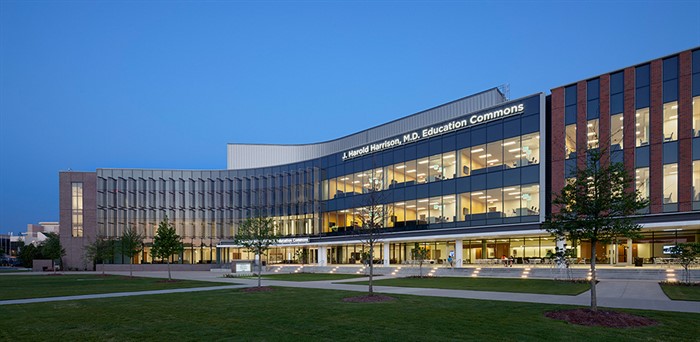Chair, Department of Neurosciences & Regenerative Medicine – Medical College of Georgia
- Position:
- Chair, Department of Neurosciences & Regenerative Medicine
- Specialty:
- Leadership, Neurobiology, Neuroscience, Neuroscientist, Leadership – Department Chair, Neuroscience, Neurobiology, Neuroscience & Regenerative Medicine, Neurodegeneration
- Location:
- Augusta, Georgia
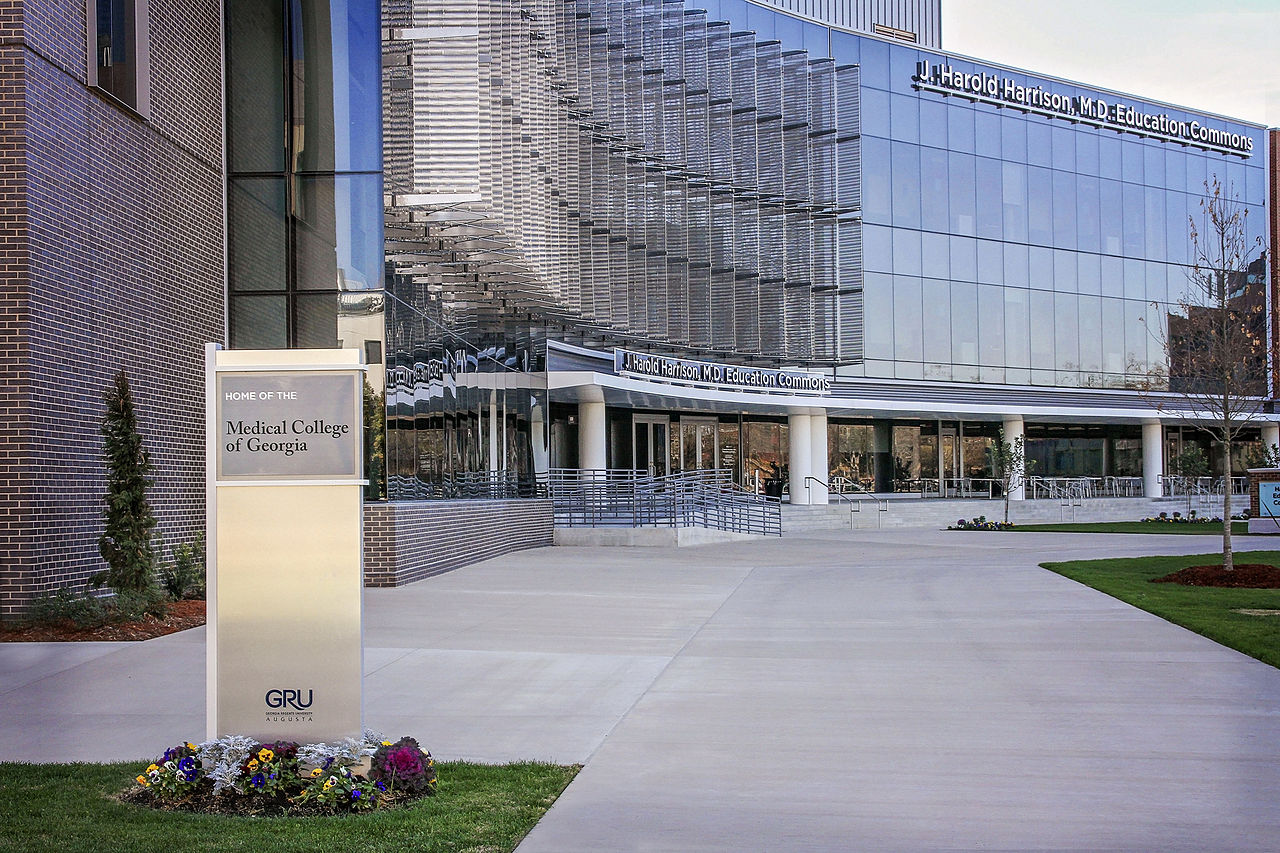
The Medical College of Georgia at Augusta University is pleased to announce the national search for a distinguished neuroscience leader to serve as the next Chair for the Department of Neurosciences and Regenerative Medicine (DNRM).
The successful candidate will be a neuroscientist PhD, MD/PhD, or equivalent, currently holding a senior faculty position at the Associate Professor or Professor rank. Ideal candidates will have an outstanding national and international reputation, a well-funded research program and a record of transformative, collaborative, and visionary leadership. The candidate should be highly regarded as a research leader in their field, with a demonstrated commitment to training and mentoring, and a passionate supporter of diversity and inclusion programs.
A robust resource package will be developed in accordance with the needs of the research programs planned. Augusta University offers generous start-up packages, excellent laboratory space, and outstanding core facilities for cell imaging, genomics and proteomics, small animal behavior, zebrafish, histology, electron microscopy, etc. Onsite technology incubator laboratories are also available on campus. It is anticipated that the successful candidate will be able to recruit a number of tenure-track faculty positions to the department and will be eligible for an Endowed Professorship. Salaries are highly competitive and commensurate with qualifications.
The successful candidate for this position will be expected to participate in teaching programs for professional and graduate students as well as all other academic, scholarly, and service functions within the university.
Position Specifics

About the Department of Neurosciences & Regenerative Medicine
Founded in 1993 by Dr. Howard Rasmussen (formerly as the Institute of Molecular Medicine and Genetics), the Department’s goal was to promote multidisciplinary research and teaching excellence in both basic biomedical and clinical science. This mission continued under the directorship of Dr. Robert Yu between the years 2000 to 2009. From 2009-2017 the Department has been headed by Dr. Lin Mei. Currently, the Department is led by Dr. Darrell Brann, Interim Chair. Our faculty study a variety of fundamental questions ranging from neurodevelopment, functions of the nervous system and regenerative and reparative medicine, using a broad repertoire of experimental approaches. A number of doctoral students of Neuroscience and Molecular Medicine PhD Programs are doing their thesis research in the Department. The Department is also a major contributor to Augusta University’s Institute of Regenerative and Reparative Medicine, a multidisciplinary consortium whose mission to improve and restore function to injured and degenerating tissues of the human body. The Department places a strong emphasis on translational research with collaborations with multiple clinical departments including Neurology, Psychiatry, Orthopaedic Surgery, Neurosurgery and Medicine.

The Brain & Behavior Discovery Institute
In a bold effort to link basic science breakthroughs in the laboratory to clinical benefits at the bedside, Augusta University launched the Brain and Behavior Discovery Institute (BBDI) on July 1, 2008. The Brain and Behavior Discovery Institute concept is ideally aligned with the national mandate for greater translation of basic research from the lab bench to the patient’s bedside.
With strong support from Augusta University and the University System of Georgia, the BBDI brings together nationally recognized scientists and clinicians who unlock the mysteries of major illnesses, such as schizophrenia, stroke, Alzheimer’s disease, Parkinson’s disease and multiple sclerosis. BBDI assembles faculty from basic and clinical departments – as well as several centers and institutes within Augusta University – and serves as a natural platform for collaborations with other leading neuroscience institutions across the country. Current research projects of the group include:
- Brain Decoding Project
- Cognition & Memory
- Stroke & Neurovascular
- Psychosis
- Regenerative Neuroscience
- Neuroscience of Hearing
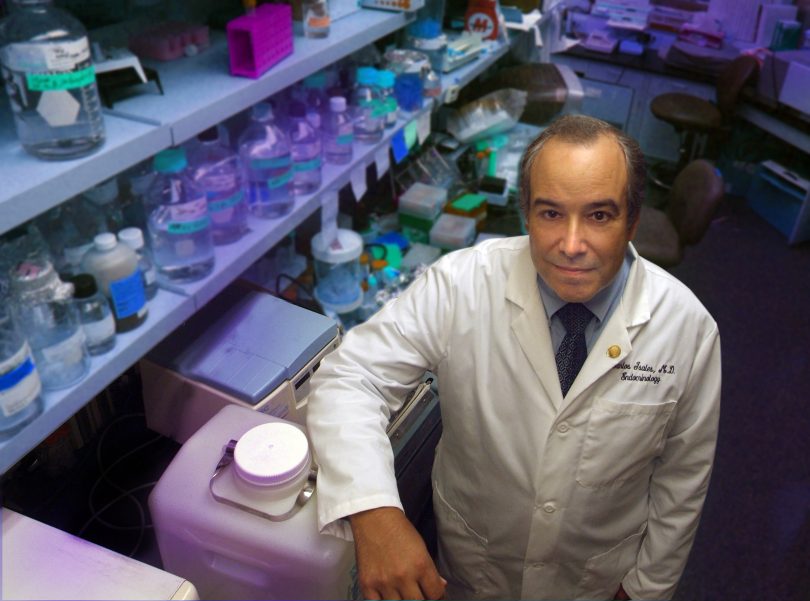
Institute for Regenerative & Reparative Medicine
The Institute for Regenerative and Reparative Medicine is working to help the body repair itself as it grows synergy between Augusta University and the community. The Center for Regenerative Medicine at Augusta University is the only center of its kind in the Southeast that integrates research and clinical expertise in musculoskeletal, neurological, and orofacial repair to address critical unmet needs in the treatment and management of traumatic injury and degenerative disease. The institute cuts across specialty and institutional boundaries to expand studies of diseases or injuries that impact the muscles and skeleton, the central nervous system and the head and neck.
Neuroscience Research Community at Augusta University
As the region’s only Academic Medical Center, Augusta University Health’s patients benefit from the medical discovery that is at the very core of our care. Our physicians seek medical solutions through research and innovation to improve outcomes of care. n this academic setting, our physicians are teachers and mentors to medical students – the next generation of physicians. As professors in the Medical College, our physicians are educators that embrace life-long learning. They are used to communicating their expertise to medical students and are as comfortable answering patient questions about health issues with the same attitude of communicating knowledge in an understandable manner.
The Neuroscience research community at Augusta University represents a group of over 80 active scientists whose research activities are supported by over $15 million of extramural funds.

Augusta University Neuroscience Center of Excellence
As a regional referral center for the southeastern US, the Augusta University Neuroscience Center of Excellence includes the area’s largest, most diverse experts in adult and pediatric neurology and neurosurgery, including renowned experts in Parkinson’s disease, stroke, ALS, MS, functional and cerebrovascular neurosurgery, and complex spine surgery. The center offers a full range of leading-edge diagnostic tests and treatments including a state-of-the-art angiography imaging technology to identify and treat problems with the blood vessels in the brain. In addition, our comprehensive stroke program is accredited by the Joint Commission on Accreditation of Healthcare Organizations and offers the only interventional stroke care in the area. Other specialty services include:
- The Augusta University Gamma Knife Center for nonsurgical treatment of brain tumors and other disorders
- REACH Call, a ground-breaking telemedicine program that lets neurologists at The Medical Center at Augusta University provide rural physicians with stroke consultations 24/7
- A Neurocritical Care Unit supervised by neurologists
- Our advanced program offers all the resources of one of Georgia’s largest academic medical centers with ongoing research in both neurology and neurosurgery and access to clinical trials. In addition, our specialists provide the evaluation and care for chronic nerve conditions such as neuropathy, carpal tunnel syndrome and other neurological disorders.
Other areas of specialized care includes:
- Neuropsychological evaluations
- Diagnosis and treatment of brain tumors in adults and children
- Spine care and surgery, including highly complex surgeries
- The latest neurovascular and endovascular treatments for cerebral disorders
- Adult and pediatric epilepsy programs
- An ALS Clinic certified by the ALS Association
- A Memory Disorders Clinic focusing on Alzheimer’s Disease
- The area’s only Multiple Sclerosis Center
- The area’s only Movement Disorders/Parkinson’s Center of Excellence

Georgia Research Alliance (GRA)
Founded in 1990, the Georgia Research Alliance represents a partnership between the state’s research universities, the business community, and the state government. Its mission is to foster economic development within Georgia by developing and leveraging the research capabilities of the research universities within the State and to assist and develop scientific and technology-based industry, commerce and business. his commitment to Georgia’s future has been made possible through a public-private partnership in which private donations are being matched by state funding.
The investments we make in talent, technology and startups come from the state of Georgia. Since 1990, the return on these investments is extraordinary: A total of $640 million has been leveraged into $4 billion in outside federal and private investment into our state. And 180 companies are currently in the GRA portfolio, all working toward market growth. The largest of these companies employs several hundred professionals.
Today, GRA is an internationally acclaimed model for unifying business, research universities, and state government to create and sustain a vibrant, technology-rich economy for the state. One of GRA’s most important accomplishments has been unifying the state’s research institutions to foster cross-university research, which is often critical when competing for federal research funding. Presidents of each university sit on GRA’s board, along with prominent leaders in government and industry.
GRA is a nonprofit (501c3), public-private partnership that partners with both the University System of Georgia and Georgia’s Department of Economic Development. Our board represents a unique alliance of top leaders from industry, academia and government – all of whom recognize the importance of an entrepreneurial economic development strategy. GRA’s impact transcends economic growth: The Alliance has played a key role in building a reputation for Georgia as a center of discovery and invention, and GRA has captured several national awards for its impact. Because of GRA’s investment and involvement, science and technology breakthroughs continue to emerge from Georgia’s universities. Our partner universities include:
- The University of Georgia
- Augusta University
- Emory University
- Clark Atlanta University
- Georgia Institute of Technology
- Georgia State University
- Mercer University
- Morehouse School of Medicine
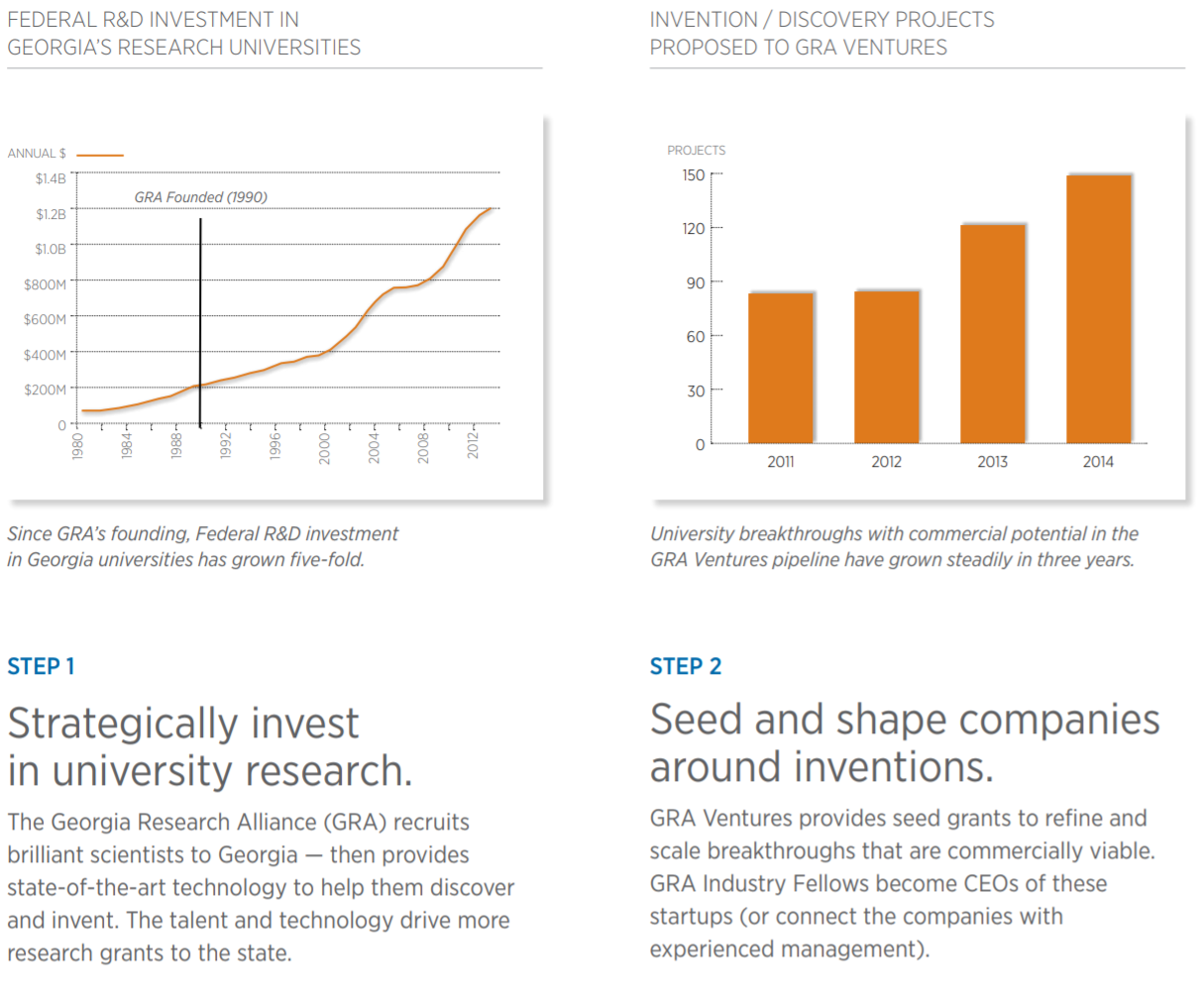
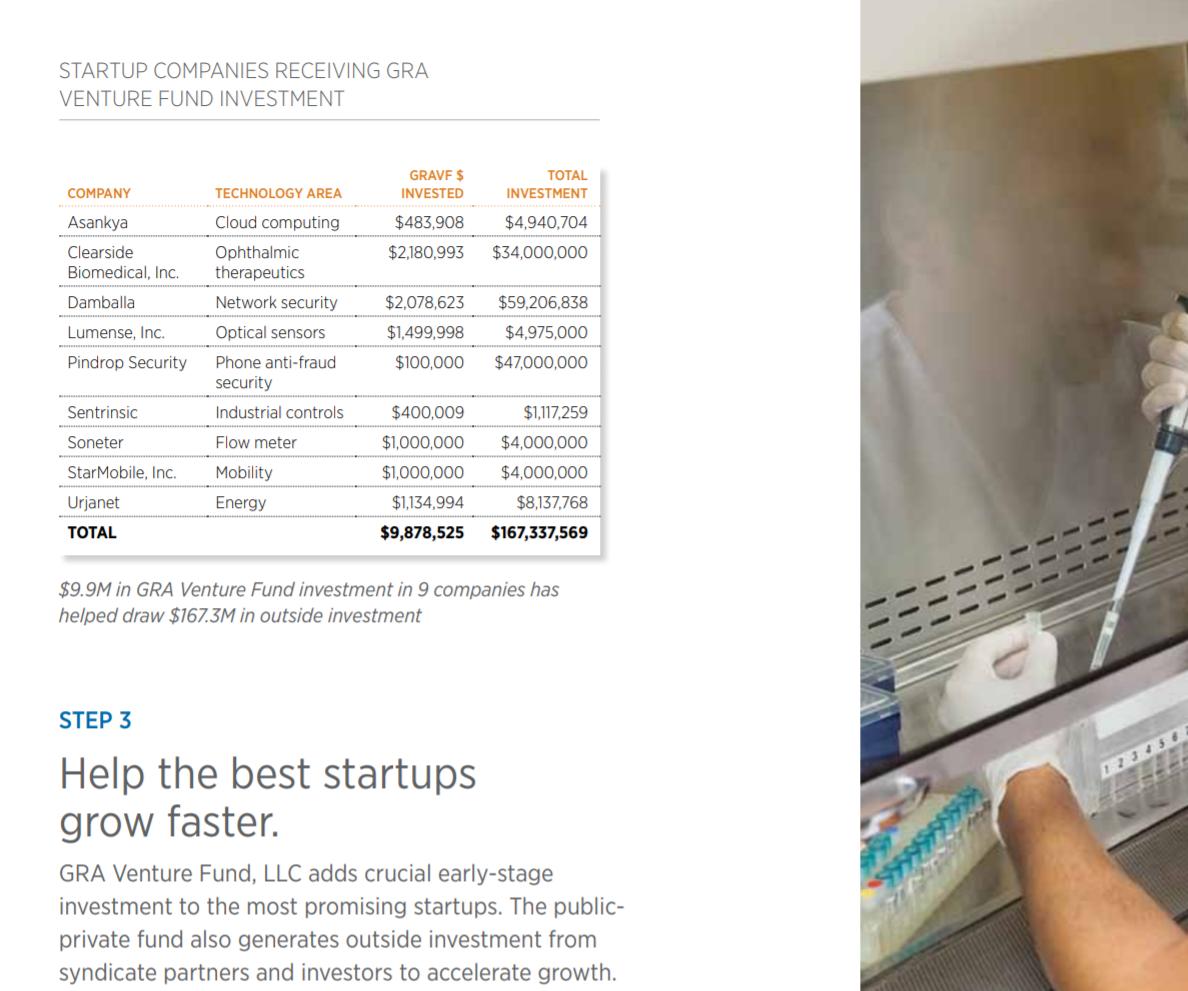
GRA Eminent Scholar Program
GRA Eminent Scholars represent the superstar scientists we help universities recruit to our state. Each Scholar occupies an endowed chair, and the university raises private funds to match GRA’s investment in the chair. GRA also makes key investments in the labs of these Scholars, so that they’re able to attract more Federal and private research dollars (currently around $530 million annually). Quite often, start-up companies are born from the work of these brilliant scientists, which drives even more investment into our state’s economy.
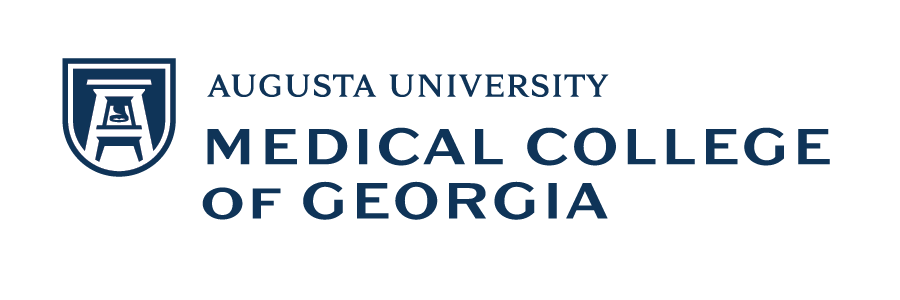
About the Medical College of Georgia at Augusta University
The Medical College of Georgia (MCG) is the flagship medical school of the University System of Georgia, the state’s only public medical school, and one of the top 5 largest medical schools in the United States. Founded nearly 200 years ago in 1828 as the nation’s fifth public medical school, the third medical school in the Southeast and the thirteenth in the nation, MCG has risen to its current role optimizing health care in Georgia and beyond through education, discovery, and service.
The Medical College of Georgia educational experience is anchored by the main campus in Augusta, as well as three regional clinical campuses for third-and fourth-year students and a second four-year campus in Athens, Georgia in partnership with the University of Georgia. The state’s medical school also offers clinical training in more than 200 sites across the state providing students experience in the full spectrum of medicine, from tertiary/quaternary care hospitals to small-town solo practices. MCG and its teaching hospitals provide postgraduate education to nearly 500 residents in 44 different programs. More than 51 percent of MCG graduates remain in Georgia to practice, well above the average retention rate of 39 percent. In 2016 MCG graduated more than twice the number of physicians going into primary care and core specialties – like family medicine, internal medicine, pediatrics, obstetrics and gynecology, emergency medicine, and general surgery – than any other medical school in the state of Georgia.
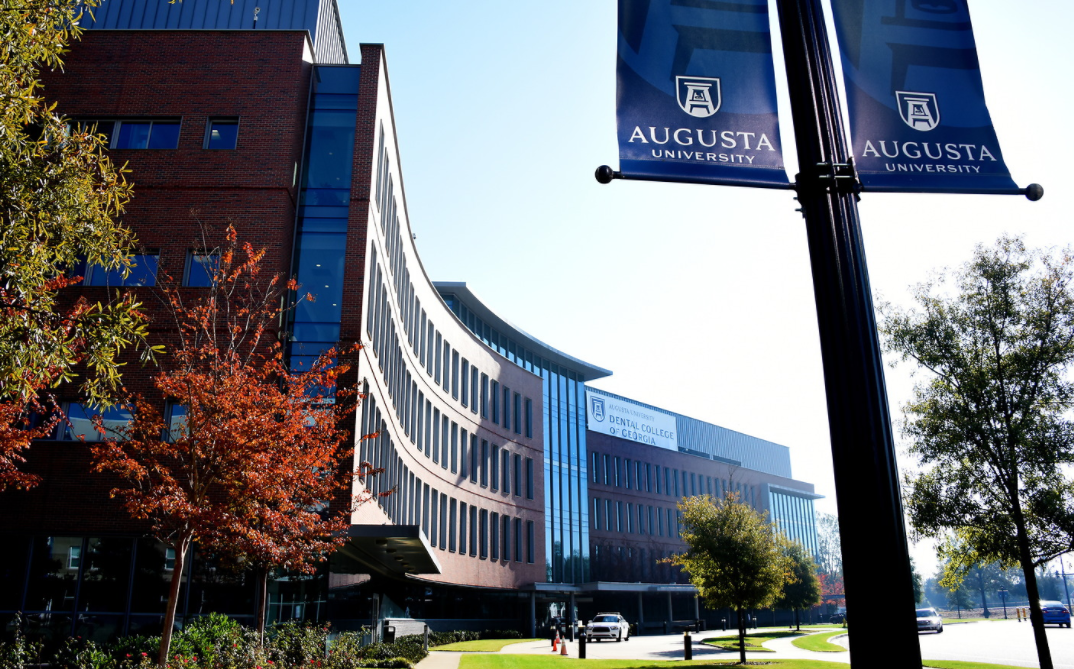
Augusta University
Augusta University, home of the Medical College of Georgia, is one of four research-intensive universities in the University System of Georgia, and the state’s only public medical school. With 920 medical students, 510 residents, and over 800 faculty members, MCG has a long-established tradition of excellence in education, research and clinical care.

Location Overview – Augusta, Georgia
Georgia’s second-oldest and second-largest city, Augusta, is situated on the southern banks of the storied Savannah River. Serving as a halfway point between the Appalachian Mountains to the north and the Atlantic Ocean to the south, Augusta is a thriving community built on a solid foundation of local pride and artistic eccentricity.
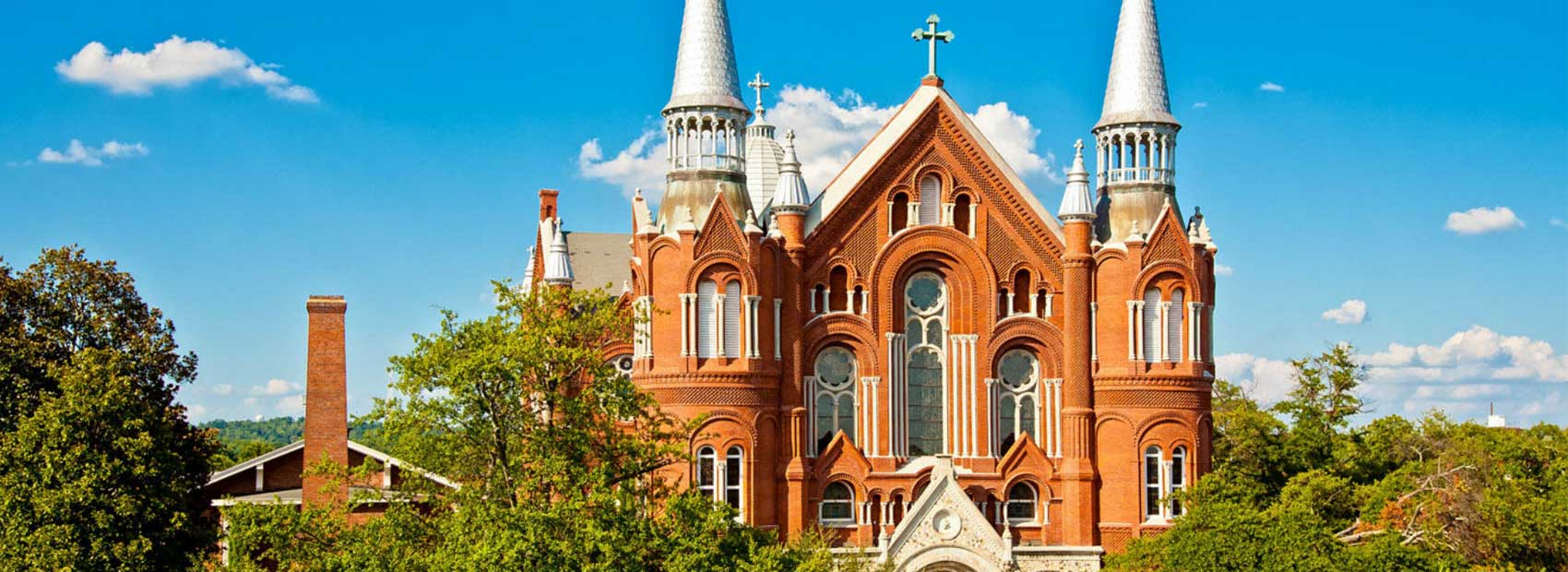
A timeless locale, a visit to Augusta is a life-altering lesson in Southern hospitality. While other places have undergone cultural revolutions, Augusta underwent a cultural evolution instead, trading big city lights and loud, busy streets for cold sweet tea and a shore-side view of the Savannah River. Downtown, locally owned shops and restaurants mingle in the shade of memorable hangouts, and state-of-the-art galleries beckon artists, lovers, thinkers and dreamers alike to the South’s “Garden City.”

Augusta is so much more than just a cozy place to live. Spearheaded by the next generation of musicians, foodies, artists and go-getters, the old city comes to life at night, offering live music, theater shows and a wealth of hole-in-the-wall eateries built to please. In addition to serving as a haven of technology and the arts, Augusta is also home to some of the nation’s most beautiful lakes and trails, offering year-round outdoor adventures.
Sporting life is synonymous with the Augusta name, and the city proper is home to a number of professional baseball, roller derby and rugby teams. Several annual sporting events take place in and around Augusta, including the Ironman 70.3 Augusta triathlon, the Augusta Futurity and the always exciting Augusta Southern Nationals, dubbed by those in the know as the “World’s Richest Drag Boat Race.”

On top of world-class entertainment and outdoor sporting, Augusta is also world-renowned as the home of The Masters—an annual golf tournament sometimes dubbed the “Super Bowl” of golf. Every year during the first full week in April, Augusta becomes the golf capitol of the world, welcoming local legends and long-time favorites back to the prettiest course on Earth.


